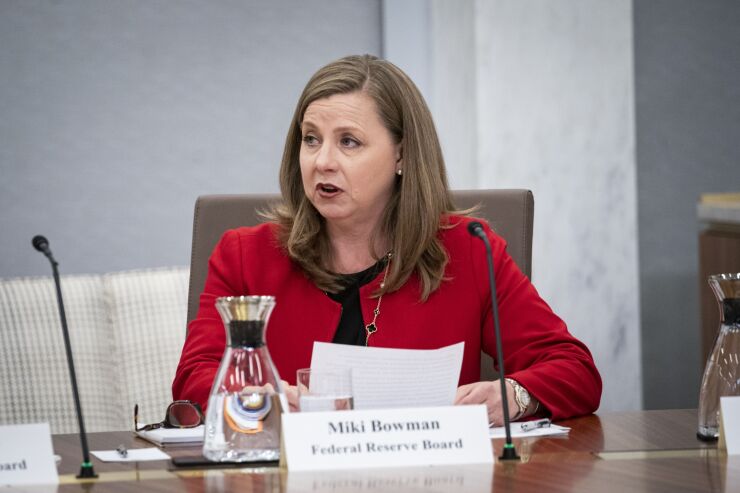
Federal Reserve Gov. Michelle Bowman said government-backed
In a Monday speech at an event for mid-market executives, Bowman said previous reviews of the bank's failure have been too limited in scope and too focused on the months directly preceding the collapse. In light of this, she reiterated her call for an
"Collectively, these reports have provided some valuable insights into the bank failure, but in my view, much work remains to ensure we have identified all of the factors that contributed to the failure of SVB, and the subsequent failures of Signature Bank and First Republic, including the actions of regulators in the lead-up to and following the failures," Bowman said. "While there is overlap between many of the findings in the reports published to date, these reports have not reached entirely consistent conclusions."
Her remarks come less than a week after the Fed's Office of the Inspector General — the agency's in-house watchdog —
Bowman has been skeptical of Barr's findings since they were released a little more than five months ago. She has also
In her speech, she said it was important for regulators to
"In my mind, bank data analysis that occurs exclusively in an off-site context prevents supervisors from leveraging important opportunities to engage with financial institutions to effectively deliver supervisory messages," she said. "It is entirely appropriate to express concern or engage in dialogue with management, or to gain a better understanding of a bank's strategic direction or risk management approach based on reported data. Financial results are key, but in the continuum of supervision, we should not forget the value of a broader based supervisory approach that uses all available tools and considers all relevant factors."
Bowman acknowledged that the Fed does not typically commission third-party reviews on bank failures, let alone ones in which the agency provides full access to supervisory information and makes personnel available for investigators to interview. But, she said, the current situation warrants such a departure.
"While this type of review would be an unusual step, it is appropriate where, as here, the existing limited reviews are driving the regulatory reform agenda, and where these bank failures have caused significant losses," she said.
Bowman reiterated that the current set of regulatory proposals combined with upcoming ones — related to the Community Reinvestment Act, climate risks and other topics — could "reshape the contours of the bank regulatory framework in important ways." She emphasized the
"The bankers in this room and across the country are vitally important to the banking system, and to the broader economy, and it is important that as reforms take shape, we incorporate your perspectives on the real-world consequences of any considered reform," she said.






